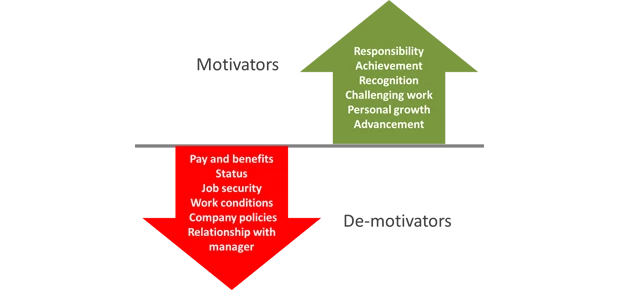
Partner Article
Why money is not a motivator for employees
As a business, you’ll want to get the best out of your team who work for you. So you might be tempted to motivate them by upping their pay or by offering them a bonus or commission. Yet research tells us that if we want to genuinely motivate our employees, we’re better off giving them responsibility and recognition, rather than using money as a carrot.
Probably the best known piece of research in this area was carried out by a psychologist called Frederick Herzberg back in the 1960s. He found that there are certain employee motivation factors that lead to higher levels of performance at work, such as recognition, responsibility, challenging work, achievement and personal growth. He also identified what he called hygiene factors which have the ability to de-motivate employees; these include pay and benefits, status, relationship with manager and job security.
Herzberg found that although hygiene factors are likely to result in dissatisfaction at work if they are missing or not sufficient, they will not motivate staff to higher performance. So when it comes to money, you do need to ensure that you are paying your team at a level that they feel is fair. But paying them more than that is unlikely to lead to better performance.
I say ‘unlikely’ because there are always exceptions to the rule. We’ve all come across people who seem to be highly money motivated. But even with such people, a pay rise or a bonus usually only delivers a short-lived increase in performance in my experience. Secondly, highly money motivated people are likely to jump ship as soon as they get a better offer elsewhere, so you might not get a return on your financial investment in them.
So what’s the alternative?
As a recent start-up, Onetouchteam doesn’t have masses of cash to offer to our employees, but we have a motivated and passionate team nonetheless. We’ve achieved this in a number of ways. We give them genuine responsibility and accountability. We trust them to get a fair amount of work done and we don’t micro-manage them. We openly recognise when they have done great work, and we don’t blame them if things go wrong. We work with them to develop their skills. We involve them in decision-making and the direction of the company. And we allow everyone to work from home so they don’t have to experience the dreaded daily commute.
So if you have a demotivated employee and are tempted to get the chequebook out, first think about whether it is genuinely because you’re not providing a reasonable amount of pay, or whether you’ve just not got enough of those ‘motivation factors’ in place.
By Stuart Hearn, CEO Onetouchteam
This was posted in Bdaily's Members' News section by Onetouchteam .
Enjoy the read? Get Bdaily delivered.
Sign up to receive our popular morning National email for free.








 Raising the bar to boost North East growth
Raising the bar to boost North East growth
 Navigating the messy middle of business growth
Navigating the messy middle of business growth
 We must make it easier to hire young people
We must make it easier to hire young people
 Why community-based care is key to NHS' future
Why community-based care is key to NHS' future
 Culture, confidence and creativity in the North East
Culture, confidence and creativity in the North East
 Putting in the groundwork to boost skills
Putting in the groundwork to boost skills
 £100,000 milestone drives forward STEM work
£100,000 milestone drives forward STEM work
 Restoring confidence for the economic road ahead
Restoring confidence for the economic road ahead
 Ready to scale? Buy-and-build offers opportunity
Ready to scale? Buy-and-build offers opportunity
 When will our regional economy grow?
When will our regional economy grow?
 Creating a thriving North East construction sector
Creating a thriving North East construction sector
 Why investors are still backing the North East
Why investors are still backing the North East